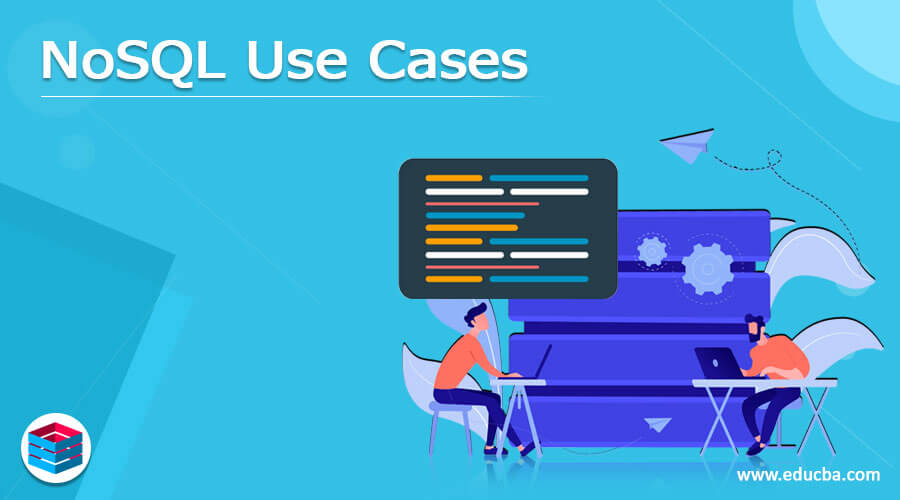Updated March 16, 2023
Introduction to NoSQL Use Cases
The NoSQL use case is the NoSQL database used for reserving and modeling the structured, semi-structured, and unstructured data in one database. The use case is the documented representation that describes how the user can carry out a piece of work on the website per the user’s point of view. So NoSQL has some use cases in which SQL performs better in personalization, real-time experience, data analytics, content management system, zero downtime, and cloud computing. And some of the use cases are helpful in fraud detection, identity validation, list, and system management.
Overviews of NoSQL Use Cases
The NoSQL system is a scattered, non-relational database that can be outlined for a huge amount of data storage and can provide high presentation skills over many servers. In which it has some predefined use cases that help increase the performance, agility, and plane, as well as exploratory and estimation analytics in real-time means a user’s point of view, SQL works better with NoSQL use cases can help to defend delicate data. It can also ensure that only authorized customers can be able to access the application; with the help of use cases, we can able to identify patterns and inconsistencies to find out the fraud in real-time in the same cases or before it occurs, such real-time investigation of large data then the historical and live data type is needful.
Uses of NoSQL Use Cases
- The NoSQL use cases have been useful for detecting fraud and recognizing unauthorized users; due to that, it can also help to find patterns and anomalies before using it.
- When we have use cases, it is helpful for organization flexibility if there are updates in their product without limiting the capacity of the data.
- Use cases can help represent, combine, and examine the new data, which can constantly be flowing to improve and establish the customer experience.
- Use of the use cases is cost-effective because we can manage, modify, query a huge amount of data, and constantly provide it to the customers.
Top 6 NoSQL Use Cases
Let us see the top 6 NoSQL use cases,
1. Real-time Experience
Nowadays, each contemporary application will need fast and real-time data accessing from the server. However, accessing data in real-time is not simple because the NoSQL databases can provide low dormant real-time experiences. Therefore, a fast organization can process new data, and its operational efficiency is also greater; the general perspective of the real-time experience is to flow the processing of new data for analyzing the historical data.
2. Personalization
The mobile and web applications provide the personalization in which it can help to upgrade the conversions, as superior personalization can dictate the huge volumes of data and that can depend on the complete data, the relational database can essential for the high-priced infrastructure in which it can handle and manage a large amount of data which is needful for personalization, at where the NoSQL database can laminate on demand. It can handle a large amount of data flawlessly.
3. Data Analytics
The operational and analytical databases can retain as two different environments regularly, and in which the applications can able to utilize the operational databases and the analytics databases cab used by the business intelligence tools for the reporting and analysis, the NoSQL databases which can avail the real-time access at the communicative place. They can support the applications and business intelligence tools at identical times; for example, the mobile and web applications can write and read information from the same NoSQL database. At the same time, any tool can approach the database for huge data analytics.
4. Content Management Systems
The content management system depends completely on the database structure, which may require speed and commodity. It has existed for many years, in which it can reserve and read any data and present it to the customer at the interconnection time; hence there is no need to define the data model in advance. The NoSQL-assisted content management system can reserve and control user-created content on the stream.
5. Mobile apps with a huge number of users
Not so long ago, mobile phones and tablets can have the top online programs for searching, shopping, and seeing web content; the applications had set out 90% of the mobile data; in a very short period, mobile users have been growing very fast with satisfactory performances, the rigid data model can also support to update the applications than relational data models, and many business organizations are focusing on constructing the web content which are using the NoSQL data stores for their applications.
6. Enriching the digital customer experience
This type of use case has been constructed on data-intensive, time-criticality such as personalization; it can also engage in managing the profiles of the users with a unified view of the customers over all your data, a disperse NoSQL database can laminate more cost-effectively, also generating the writing intensively, it also has multiple schemas which have infrastructure like RDBMS, the multimedia service provider has been using to give a constructive customer assistance, the main purpose of the platform is to catch data from a large number of communication and respond to the customer experiences over multiple strings, particularly it can manage the ever-growing number of characteristics.
Conclusion
In this article, we conclude that the NoSQL use case is the document in which we can able to decide how the user can work with the website; hence use cases are necessary; we have also discussed the uses and some top use cases of NoSQL so that this article will help.
Recommended Articles
This is a guide to NoSQL Use Cases. Here we also discuss the introduction, overview, and uses along with the top 6 NoSQL Use Cases. You may also look at the following articles to learn more-



